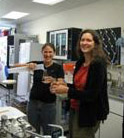 Opportunities:
Opportunities:Positions are available for enthusiastic and motivated graduate and undergraduate students. Graduate students can receive funding in the form of teaching assistantships or research fellowships. Undergraduates can receive independent study credit, or can apply for a small fellowship. If you are interested in joining the Brauer Lab, please stop by Rankin Science West 264, or email: [email protected].
Research Projects:
Methane-producing Microbes in Local Peat Bogs:
 In the past two centuries, the concentration of methane in the earth's atmosphere has doubled, contributing to climate changes including warmer temperatures, rising sea levels, retreating glaciers, heavier rainfalls and decreased snow falls. Acidic peat bogs are a major natural source of methane to the atmosphere, but the microbial processes contributing to that release are poorly understood. Students in my laboratory at Appalachian State University employ molecular, chemical, and microbiological techniques in combination with cutting-edge genome studies. The major goals are to: 1) understand how these methane-producers have adapted to the low nutrient, low pH environments, 2) identify the most important and abundant methane producers in southern peatlands, and 3) culture novel methane producers that may later be used in bioreactors for energy production. Opportunities abound, so I encourage you to apply!
In the past two centuries, the concentration of methane in the earth's atmosphere has doubled, contributing to climate changes including warmer temperatures, rising sea levels, retreating glaciers, heavier rainfalls and decreased snow falls. Acidic peat bogs are a major natural source of methane to the atmosphere, but the microbial processes contributing to that release are poorly understood. Students in my laboratory at Appalachian State University employ molecular, chemical, and microbiological techniques in combination with cutting-edge genome studies. The major goals are to: 1) understand how these methane-producers have adapted to the low nutrient, low pH environments, 2) identify the most important and abundant methane producers in southern peatlands, and 3) culture novel methane producers that may later be used in bioreactors for energy production. Opportunities abound, so I encourage you to apply! Manganese-oxidizing Bacteria in Local Caves:
 1) Tennessee is home to approximately 1/6 of our nation's caves. These unique and fragile underground caverns are important habitats for a rich diversity of species. A decade or more ago, cave creation was considered to be a result of exclusively chemical and geophysical processes. We now know that tiny bacteria inside the cave walls help contribute to cave formation by weathering the rock, causing it to become porous, crumble, and/or more readily dissolve away. Evidence of this microbial activity can be seen in the form of slimy coatings (called biofilms) and brown/black patina (called ferromanganous deposits) enveloping the rocks. Come join our lab and help isolate novel species, and contribute to our understanding of how these tiny cells transform the cave environments!
1) Tennessee is home to approximately 1/6 of our nation's caves. These unique and fragile underground caverns are important habitats for a rich diversity of species. A decade or more ago, cave creation was considered to be a result of exclusively chemical and geophysical processes. We now know that tiny bacteria inside the cave walls help contribute to cave formation by weathering the rock, causing it to become porous, crumble, and/or more readily dissolve away. Evidence of this microbial activity can be seen in the form of slimy coatings (called biofilms) and brown/black patina (called ferromanganous deposits) enveloping the rocks. Come join our lab and help isolate novel species, and contribute to our understanding of how these tiny cells transform the cave environments! 2) Cave and karst systems are vital sources of drinking water and they support some of the most fragile and diverse ecosystems on earth. However, these subterranean systems are especially vulnerable, as they are often intimately connected with wastewater pathways as well as non-point source pollution. Our lab is also investigating anthropogenic impact on the microbial populations and biomineralization processes occurring in these systems. Come join our quest and learn how to use molecular and water chemistry analyses to examine changes in microbial communities in response to agricultural runoff and sewage releases!
Additional information can be found in my curriculum vitae.